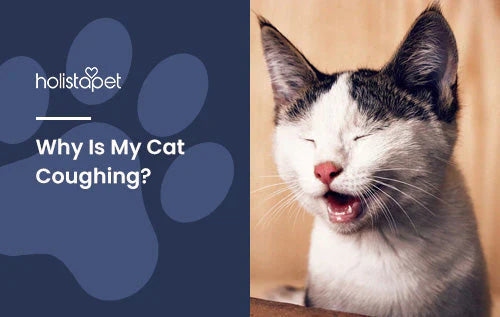Cat coughing and sneezing could mean many things, and it can be overwhelming to navigate through all of the potential causes. How can we tell a retch from a gag or an asthmatic cat cough from a hairball? Throughout this article, we'll go through all of these questions and more to ensure your cat gets the proper care it needs.
Is It Normal For My Cat to Cough?
Occasional coughing in cats is normal, so there's no need to rush your kitty to the veterinarian at the first sign. Your pet's respiratory tract can get irritated just like a human's, so the issue could be as simple as dust or fur that your cat is trying to expel. What's important is that you pay attention to the sounds your feline makes. If coughing, retching, hacking, or gagging becomes frequent, veterinary help is probably needed.
What Does a Cat Cough Sound Like?
Knowing that each cat is capable of producing its own unique noises, their cough will generally sound like that of a human (though small and rough), crossed with a short, hacking feline hiss. Wheezing might also be present in a cat's cough, but not always. A honking noise (think of a goose's honking) could be indicative of a tight collar. It is best to focus on frequency and whether your cat's cough is productive (producing fluid, phlegm, or other material), rather than attempt to diagnose your pet by sound alone.
What Is Normal vs. Excessive Coughing In Cats?
You will not often see a coughing cat compared to humans or even dogs, so if your cat's respiratory issues last for multiple days, this is considered excessive. Pay attention to the noise your feline is making to prepare for a vet's questions. How frequent is the coughing? How long has the issue been affecting them? Is it productive? Is it a wet or a dry cough? Has the animal lost weight? Some pet owners explore natural remedies like CBD oil to support their cat’s respiratory health. Any additional symptoms you can provide the veterinarian with will help them and your pet!
Common Causes for Cat Coughing
When it comes to felines, the causes of coughing are numerous. Cats are sensitive to strong odors, as well as dust. Let's take a look at some causes of coughing in cats and the symptoms they might show:
Infection
Lower respiratory infections are often indicated by wet, productive coughing. The exact type of lower respiratory problem is something your veterinarian can help you determine. Viral infections could also be the culprit if you notice your cat sneezing and coughing, or if you notice a cat wheezing sound. Infections like feline herpesvirus or feline calicivirus require specific care, so consult with a specialist before moving forward.
Parasite
Parasites or worms are common in felines and could be the reason your cat is coughing. Regardless of respiratory trouble, you should make sure your pet receives regular blood and fecal tests. Two common worm problems in cats are tapeworm or roundworm infections and are usually brought on by swallowing a flea or larvae. Heartworm disease may also induce severe coughing and other potential health concerns.
Allergies
Chronic coughing and wheezing could mean your pet has allergies. Many times skin and eye irritations accompany these symptoms, along with difficulty breathing due to a failing respiratory system.

Asthma
Asthma attacks present in 800,000 U.S. cats and may be treated with corticosteroids and/or bronchodilators. If your cat coughs constantly, your pet may have asthma. Other signs are a crouched, neck-extended position between hacks and wheezing. Feline asthma is commonly brought on by your cat inhaling allergens or other irritants. These causes include pollen, cologne or perfume, mold, dust from cat litter, and smoke. Though common, asthma that goes untreated can become life-threatening.
Histoplasmosis
Histoplasmosis is a fungal lung infection caused by the inhalation of spores. Cats with this infection have a short, productive cough and show mild fever, depression, low appetite, and weight loss. While treatment for histoplasmosis is available, not all pets survive. 4-6 months of medication and treatment — including blood tests and X-rays — are necessary if your cat's lungs are infected.
Pneumonia
Pneumonia is lung inflammation signified by a deep cough and labored breathing. If your pet has pneumonia, it's inflamed airways are restricting the flow of oxygen. If your cat's tongue and gums are a grey or blue color, your pet is not receiving enough oxygen and should immediately be taken to the veterinarian. Additional symptoms can include lethargy and .
My Cat is Coughing – How Do I Stop It?
Some house cleaning will go a long way to help your coughing cat. Additionally, keep smoke away from felines, as well as allergens if they're susceptible. Common cat allergens include dust, pollen, fleas, perfumes, and some cleaning materials with artificial fragrances. If a clean household and minimal exposure to allergens aren't calming your cat's lungs, veterinary help is advised.
Does your cat cough up hairballs from time to time? Try grooming and bathing them more often to help get rid of excess hair before they swallow it. Remember, every once in a while, hairballs can be a normal occurrence, especially with longhair breeds. Additionally, CBD calming chews for cats may help support overall wellness and relaxation.
Related: Cat Hairball Home Remedies [Top 12 Tips]
When Should I Go To The Vet for a Coughing Cat?
Coughing is generally uncommon among cats, so it shouldn't take much before a trip to the vet is in order. If your cat is coughing up hairballs more than twice a year or if they can't regurgitate one when they try, you should take it to see the vet. Additionally, if a cough lasts longer than two days, or respiratory issues recur every few weeks, consult an expert.
The general amount of oxygen a cat is getting can be inferred by examining a cat's mouth. If its tongue and gums are a blue or grey color, your pet might not be receiving enough oxygen and should be taken to the veterinarian immediately.

Final Thoughts
If your cat starts to cough, gag, retch or otherwise hack, don't dismiss it. Listen to the sound of their cough and check to see if it's productive. Pay attention to their daily routine and remove allergens from your home. If a cough lasts longer than two days, take your pet to the veterinarian. The love and care you show for your pet won't go unnoticed, as millennia of cat-owners have proven to our feline friends that we'll do anything to look after them!


 CBD Oil for Cats - Fast Acting
CBD Oil for Cats - Fast Acting
 CBD Cat Treats - Easy Dose
CBD Cat Treats - Easy Dose
 CBD Calming Chews for Cats - Highly Rated
CBD Calming Chews for Cats - Highly Rated
 CBG Oil for Dogs and Cats - Loved by Thousands
CBG Oil for Dogs and Cats - Loved by Thousands





Leave a comment
All comments are moderated before being published.
This site is protected by hCaptcha and the hCaptcha Privacy Policy and Terms of Service apply.